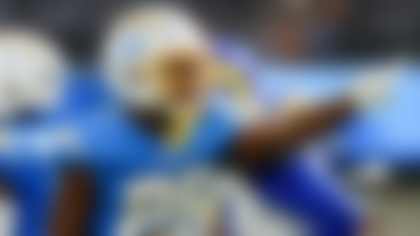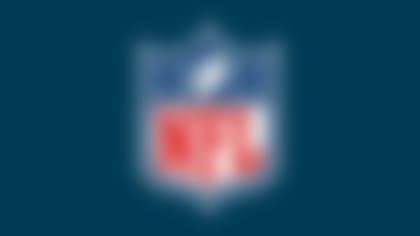The NFL asserted in a 61-page brief filed Monday to the 8th Circuit Court of Appeals that a judge's decision to grant an injunction to lift the two-month-old lockout was unreasonable.
"This Court should vacate the District Court's grant of a preliminary injunction and remand with instructions to dismiss or stay the action," the NFL concluded.
Removing the lockout without a new collective bargaining agreement in place would allow better-off teams to sign the best players, tipping the NFL's competitive balance and damaging the league, its attorneys argued in advance of a June 3 hearing in St. Louis on the appeal of U.S. District Judge Susan Richard Nelson's decision.
NFL tries to stay one step ahead
Jason La Canfora reports the league is currently weighing its options concerning free-agency rules should it be ordered
to re-open for business. **More ...**
Nelson issued an injunction that lifted the lockout April 25. But the 8th Circuit issued a temporary hold of that order by a 2-1 vote four days later, meaning players can't work out or sign contracts with any of the NFL's 32 teams.
Court clerk Michael Gans reiterated Monday that judges Kermit Bye, Steven Colloton and William Duane Benton could keep the temporary stay in place until the June 3 hearing.
The players' reply to the NFL's brief is due May 20. The league's reply to that is due May 26.
The arguments in Monday's filing were an expanded version of what the league has claimed all along: that the NFL Players Association's move to decertify after the initial bargaining talks broke down March 11 is a sham; that Nelson doesn't have the jurisdiction to lift the lockout; and that she should have waited for a decision from the National Labor Relations Board on the union's status before issuing that ruling.
The league also said that lifting the lockout without a labor deal in place would cause chaos, with teams trying to make decisions on signing free agents and making trades under a set of rules that could drastically change under a new agreement.
"It would be difficult, if not impossible, to unscramble the eggs and return those players to clubs that otherwise may have had contract arrangements with (or, at least, a greater ability to enter into contracts with) such players in the absence of an injunction," the league's court brief said.
In the case that the NFL is forced to open its doors -- either through the denial of a longer stay or failure of an appeal -- it would be forced to impose work rules for the 2011 season, a subject the league addressed in a statement.
"Our goal has at all times been the same -- to operate under a negotiated set of procedures that are agreed to by the clubs and the NFLPA," NFL spokesman Greg Aiello said Monday. "The current litigation has created a significant amount of uncertainty and we are therefore considering a wide range of alternatives depending on developments."
From a logical standpoint, using an older, previously agreed-upon set of rules likely would protect the league's negotiating position and minimize losses in damages, which have led most to believe that a roll-over of the 2010 rules is the most likely scenario if the lockout comes to a forced end. But multiple NFL officials told NFL Network insider Jason La Canfora that no decision has been made.
The group of players suing the league -- including star quarterbacks Tom Brady, Peyton Manning and Drew Brees -- have said the lockout is inflicting irreparable harm on their brief playing careers by preventing them from working out at team headquarters, holding full practices with teammates and coaches and also jeopardizing games. Nelson agreed and issued the injunction.
But the NFL said Monday that the judge "failed entirely to consider the serious, immediate and irreparable harm the injunction posed to the NFL" and "vastly overstated both the harm to the (players) and the nature of that harm."
The league argued in the filing that Nelson's injunction "undercut" its leverage by allowing the players to circumvent the lockout and further delayed constructive bargaining talks, which they deemed "the essence of irreparable harm."
"As to harm to the NFL, federal labor law permits an employer to institute a lockout 'for the sole purpose of bringing economic pressure to bear in support of his legitimate bargaining position,' " the attorneys wrote.
The league continued to pound away at the players' decision to disband their union, attempting to use some of the players' own quotes in various media outlets over the last few months to prove their point. They cited public comments by Baltimore Ravens wide receiver Derrick Mason, NFL Players Association vice president Jeff Saturday, plaintiff Mike Vrabel and others discussing the solidarity the players still feel even though the union has decertified.
The league also argued that players don't suffer because the lockout applies equally to everyone.
"Because there are no practices or other organized football activities conducted during a lockout, no player suffers a risk of career-threatening injury or physical wear and tear," attorneys wrote.
The longer the fight over how to divvy up $9 billion in annual revenue drags, the closer the league and players come to missing games. The first preseason game is just over two and a half months away, on Aug. 7, and the regular-season opener between the New Orleans Saints and Green Bay Packers is set for Sept. 8 at Lambeau Field.
The next big day for the sides is Thursday, when U.S. District Judge David Doty will hear arguments on what to do with some $4 billion in television revenue. Doty already ruled that the NFL secured the money in bad faith as a "lockout fund," and the players have asked for unspecified damages in the case.
The sides also are scheduled May 16 to restart mediation, ordered by Nelson and held under the auspices of U.S. Magistrate Judge Arthur Boylan.
Also on Monday, the NHL filed a brief in support of the NFL. Labor strife caused the hockey league to cancel its 2004-05 season, and its current collective bargaining agreement expires in 2012.
"While the facts and circumstances may differ as between our league and the NFL, the issues presented on this appeal are of central importance to the NHL and to all participants in collective bargaining relationships in the United States," NHL attorneys wrote.
The Associated Press contributed to this report.



